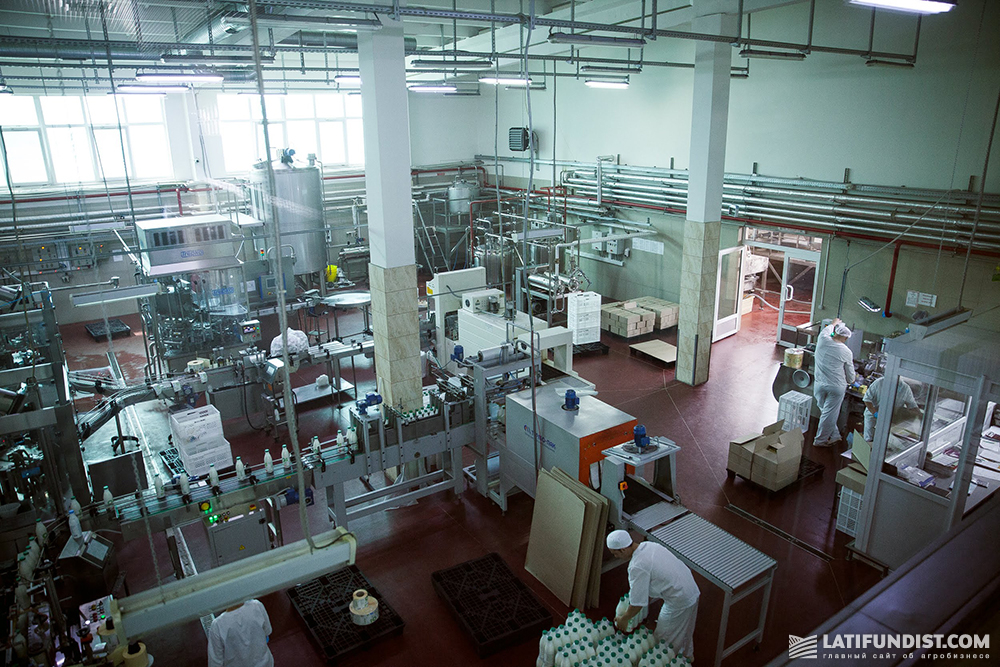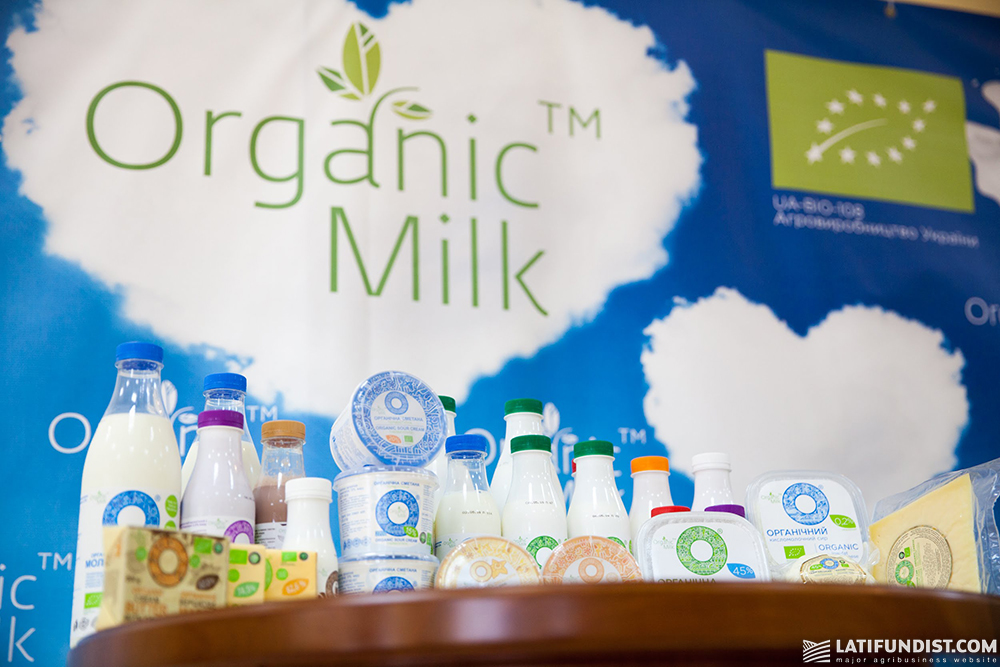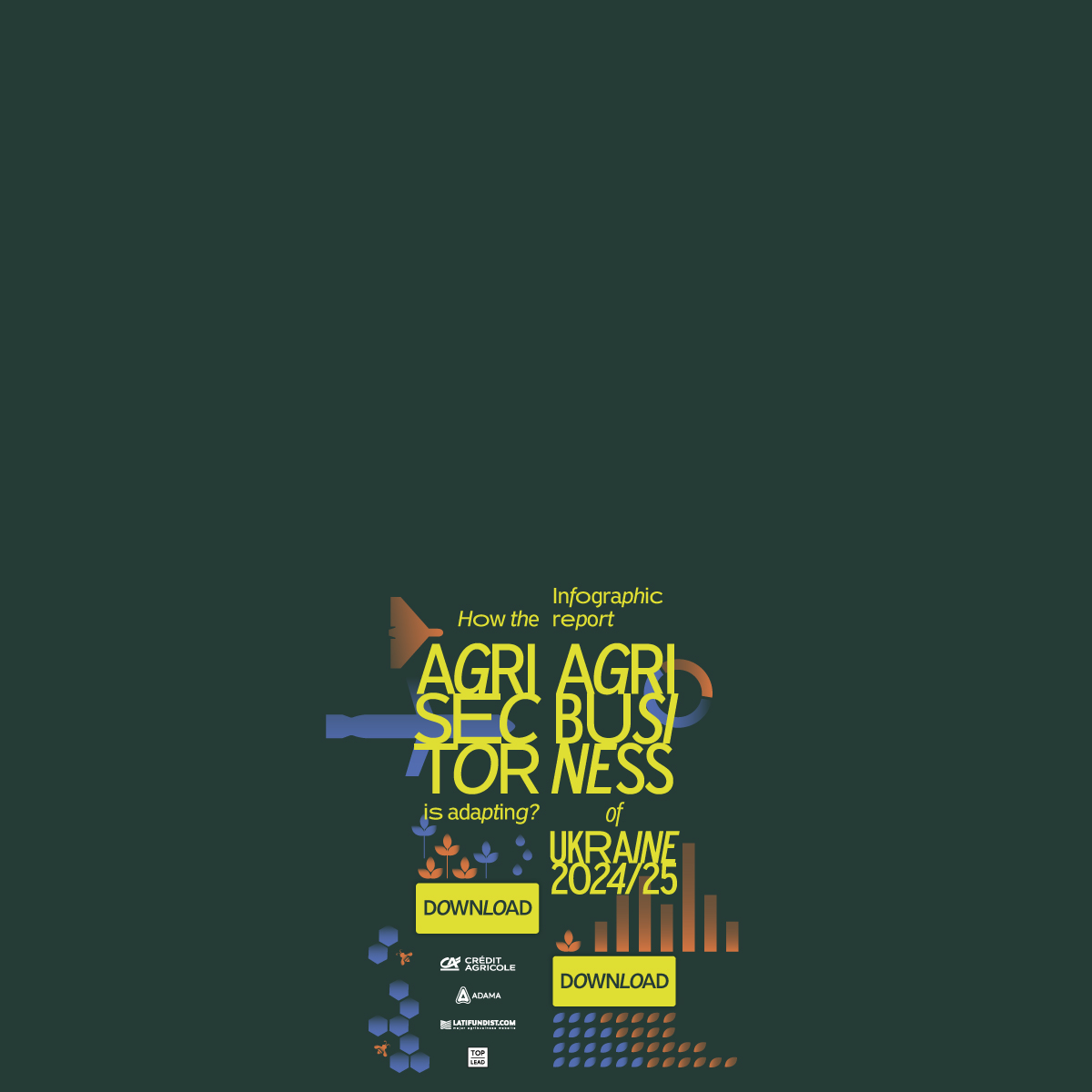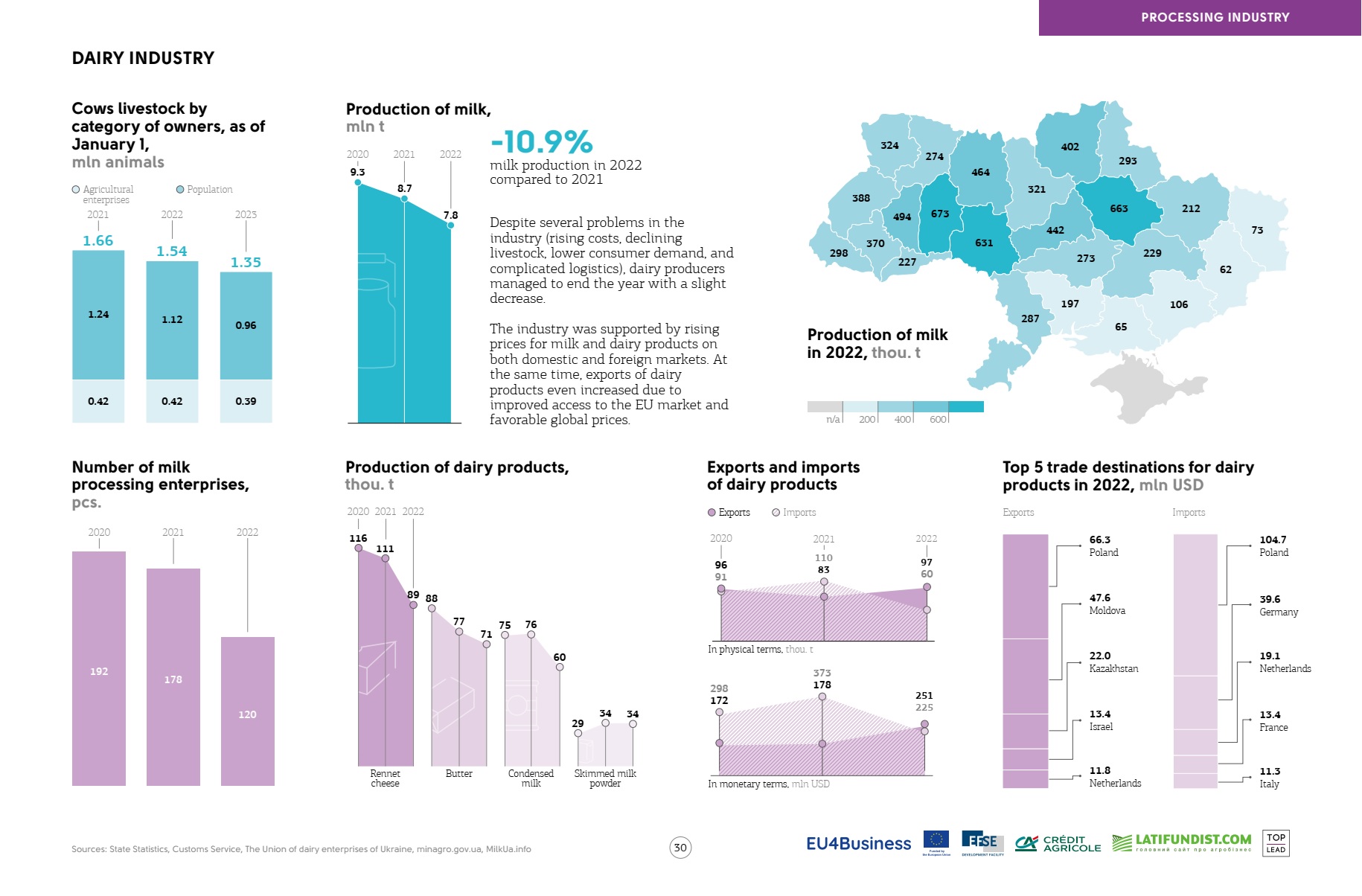
Survive And Transform: Ukraine's Dairy Industry During The War
From the first explosions and shock, the death of workers, destroyed infrastructure and cow herds, blackouts and fuel shortages to entering the European markets. During the last 2 years of full-scale war, the dairy industry of Ukraine is responding to all the challenges of today, trying to constantly adapt and transform. The longer the war lasts, the deeper the problems of the industry, for example, the shortage of raw milk deepens, moreover, new problems are added, such as the blockade of the western border of the country. At the same time, the dairy industry of Ukraine continues to work, survive and find its place under the sun on the global map of the world.
Download the Infographic Report Agribusiness of Ukraine 2022/23
What are livestock numbers?
During 2015–2021, the total number of cows in Ukraine decreased by almost a third. Before the war, 42% of all milk was produced in the regions that came under the greatest shelling and occupation by the Russians. So, in 2022, during the martial law, the number of cows decreased by more than 191,000 heads, or by 12.4%.
In 2023, the tendency to reduce the number of cows in Ukraine remained, so the number decreased by more than 95,000 cows, or 7.1% of the indicator at the beginning of the year. Thus, the total number of cows in Ukraine as of the beginning of 2024 is expected to be at the level of 55.5% of the indicator of the beginning of 2015.
Is there enough raw material at the dairies?
It is worth noting that due to a significant decrease in the number of cows in agricultural enterprises, the amount of milk produced by them in 2015–2021 was practically unchanged and fluctuated between 2.67–2.77 million tons. This became possible due to a significant increase in the productivity of cows kept by agricultural enterprises, which increased by 74% during the period 2010–2021 — from less than 4 thousand kilograms in 2010 to 6.9 thousand kg/head in 2021.
However, in 2022, official statistics recorded a decrease in cow productivity, which is quite logical for a period of martial law, due to animal shock from explosions and other animal health problems.
As a result, the industry constantly experiences a shortage of raw materials, especially high-quality ones. Raw milk continues to rise in price due to its limited supply in the domestic market, which affects the price of the finished product.
Mobilization and shortage of personnel
In addition to the shortage of raw materials, the industry also experiences a shortage of personnel. Some of the workers have gone to fight, some have gone abroad, and accordingly the shortage of personnel is growing. If the war continues, this problem will only get worse. And although it may seem that the training and development of personnel is not timely in these difficult times for Ukrainian business, such a decision can be a solution to the double crisis that has developed in the labor market. In addition, company representatives need to know how to book employees, how to properly register new employees from among forcibly displaced persons.

European integration in turbo mode
The liberalization of trade with Europe affected the export of Ukrainian dairy products to the European market, which enabled the industry to stay afloat. Already more than 50 dairy processing sites have permission to export dairy products to the EU. Therefore, the decision of the European Council on December 13, 2023 regarding the adoption of negotiations on Ukraine's accession to the EU was a positive development.
At the same time, there is a lot of work ahead on the implementation of European legislation and the integration of institutions to European standards. According to the initial assessment of the state of implementation of EU legal acts, Ukraine has to implement about 3,000 European regulatory and legal acts. Ukraine will have to do the most work on the implementation of EU legislative acts in the field of food safety, phytosanitary and veterinary policy — more than 300 acts.
What is to be done in 2024?
In 2024, the country should, in particular: continue the coordination and implementation of EU acts to fulfill the requirements of the Association Agreement, with an emphasis on sanitary-hygienic and phytosanitary measures, to speed up market integration with the EU through the Trade Control Pilot System (TRACES) project with further expansion of its use throughout the country; increase the fight against falsification of dairy products. Environmental issues in agriculture, which become even more relevant during the war, require special attention.
The integration of Ukraine into the EU market does not provide automatic access to it for all domestic exporters, but only provides an incentive to modernize production in accordance with European standards, they will be able to maintain competitiveness and open new sales markets. However, let's be honest, it will be difficult to carry out modernization during the war, when the industry is already on the verge of survival, and any modernization requires additional funds, so this must be taken into account in sufficient transitional periods during the implementation of European legislation to national, so that business it was time to fulfill all the requirements.

Has the border blockade hit dairy producers hard?
Due to the broken logistics chains since the beginning of the full-scale invasion, the lack of opportunity to send goods through the Black Sea ports, the cost of delivery to the importing countries has increased significantly, for some routes by a factor of five. At the same time, companies quickly tried to reorient themselves and began to export products through the western border of the country. Thus, in 2022, Ukraine exported dairy products worth USD 250.8 million to 96 countries of the world.
The largest importers:
- Poland 26.1%
- Moldova 18.8%
- Kazakhstan 8.6%
- Israel 5.1%
- the Netherlands 4.7%
The blockade of the border by Polish carriers, and later by Slovak and Hungarian carriers, almost paralyzed the entire industry. Dairy products are perishable and delays at the border lead to numerous negative consequences for the dairy industry, as well as for business in Ukraine and their counterparts abroad.

Reroute, what's the problem?
At first, a change in routes was observed, queues at the Slovak and Hungarian borders increased. Later, blockades began on these borders as well. The business is already reporting a shortage of transport, in particular due to the reluctance of carriers to take orders during the strike.
Failure to fulfill obligations to Ukrainian and foreign customers will result in fines, cancellation of further orders and loss of customers. The impossibility of importing the necessary raw materials or components creates risks for Ukrainian industries. All this directly affects the access of buyers to the necessary goods and the smooth operation of enterprises.
According to calculations by the European Business Association, on average, one day of downtime costs one company losses in the amount of about UAH 1 million. It is worth emphasizing that both importers and exporters suffer equally, because 49% of companies import products to Ukraine. At the same time, 25% of goods go to Poland, 15% to Germany, as well as to other Baltic countries, Western Europe, the USA, Canada, Asian and African countries.
Is there a light at the end of the tunnel?
It is necessary to learn to hear each other, because the best solution to problems is mutual dialogue, especially during war, because we have only one enemy. Therefore, the business community of Ukraine constantly calls on Polish business to negotiate to unblock the Polish-Ukrainian border and resolve disputed issues in a constructive way.
We hope that in the near future, these issues will be resolved as soon as possible because this is a matter of survival for many companies. Research by the World Bank shows that Ukraine has a great potential for milk production, while the world is experiencing a shortage of dairy products. Ukraine can strengthen the EU in export markets, as milk production is gradually reduced in Europe within the framework of the Green Deal and the reduction of CO² emissions caused by the vital activity of cows.
In the perspective of a decade, Ukraine can increase the production and processing of milk for export to the markets of Africa and Asia, where these products were actively supplied before the war. In addition, the World Bank has approved assistance for the agricultural sector of Ukraine in the amount of 500 million for 2023-2024. Of these funds, UAH 230 million will be allocated to grants, UAH 270 million to compensation for long-term loans taken out by farmers under the "5-7-9" preferential lending program, which will also be able to support the industry during the war.
Tetiana Shyrochenko, Committees Manager, European Business Association

